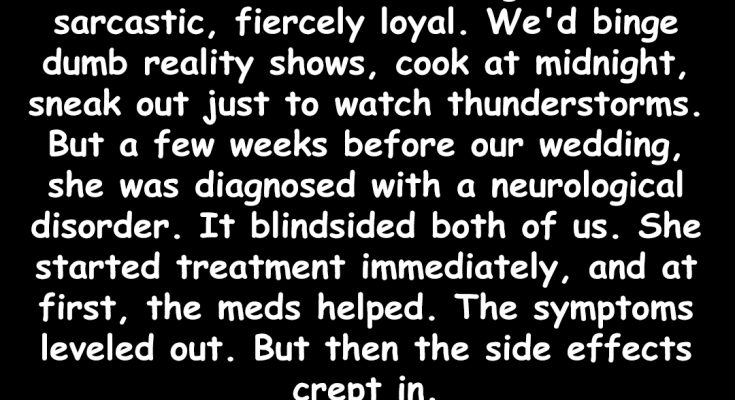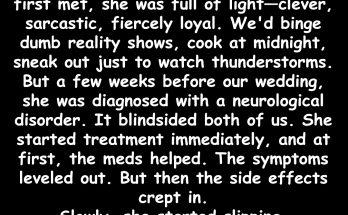She used to dance in the kitchen and laugh in her sleep. Now she just stares past me.
We’ve been married seven years, together for ten. No kids, good jobs, a dog we spoil like a toddler. When we first met, she was full of light—clever, sarcastic, fiercely loyal. We’d binge dumb reality shows, cook at midnight, sneak out just to watch thunderstorms.
But a few weeks before our wedding, she was diagnosed with a neurological disorder. It blindsided both of us. She started treatment immediately, and at first, the meds helped. The symptoms leveled out. But then the side effects crept in.
Slowly, she started slipping.
No more singing in the shower. No more late-night talks. No more spark. She’s not sad exactly—just numb. She says she doesn’t feel much of anything anymore.
I’ve begged her to talk to her doctor. She says she already has. That this is “the best option” and she’d rather be flat than in pain.
I understand. I do.
But I feel like I’m married to someone who’s technically alive, but emotionally checked out.
When I told her I was struggling, that I felt like I was grieving a person who’s still here… she said something so hollow, it nearly broke me—
“Maybe it’s time you let go.”
It was the way she said it. No anger. No pain. Just blank. Like she didn’t care either way.
I went for a walk that night. I left our dog with her and just… wandered. I ended up at this little diner we used to go to when we were dating. It was late, and the waitress looked like she was ready to close up, but she saw the look on my face and let me sit.
I stared at the menu for a long time. Didn’t order. Just sat there wondering if I was already alone.
The next morning, I got up early and made her coffee the way she liked it—two sugars, oat milk, the blue mug with the chip on the rim. She took it, nodded, and walked away without a word.
Something inside me cracked. That tiny moment, her indifference—it felt louder than a scream.
I decided to take some space. Told her I was going to visit my brother for a few days. She just nodded again. Not even a hug.
My brother lives a few towns over. He’s got two loud kids and a fixer-upper house that’s always half-painted. I slept in his guest room, and for the first time in months, I slept through the night.
He asked if everything was okay, and I told him the truth. All of it. I didn’t mean to break down, but once I started talking, it was like the dam burst. He didn’t interrupt. Just listened and handed me a beer.
“Sounds like you’re grieving,” he said.
“I am,” I told him. “But she’s still breathing.”
He nodded slowly. “Have you talked to anyone? Like…a therapist?”
I shrugged. “Doesn’t seem like it’ll fix anything.”
He said, “Maybe not. But maybe it’ll fix you.”
That stuck with me.
I made an appointment that week. Virtual, since I still had to go back home. The therapist—her name was Marianne—was calm and warm in a way I didn’t expect. She didn’t try to tell me what to do. Just helped me sort out the mess in my head.
Week by week, I started to understand that what I was feeling wasn’t betrayal. It was grief. The person I married—the vibrant, curious, emotional woman—was hidden under layers of medication and numbness.
But something else Marianne said made me pause.
“Are you sure she wants to be unreachable? Or is she doing the best she can with what she’s been given?”
I hadn’t really asked. I’d told her how I felt. But I never asked her what she felt. Or if she missed herself too.
So one night, I made her tea instead of coffee. Sat down beside her on the couch and said, “Can I ask you something? No pressure to answer.”
She blinked, then nodded slightly.
“Do you miss…you? The way you were before?”
There was a long silence. Then, for the first time in weeks, her eyes filled with tears.
“Every day,” she whispered. “I feel like I’m trapped inside a fog. I know I should care more, feel more. But I can’t reach it. It’s like watching life from underwater.”
I took her hand. It was cold.
She kept talking. Said she hadn’t wanted to burden me. That she thought I’d be better off if she kept things simple, predictable. That the flatness was easier than the pain, but sometimes she wondered if it was worse.
She said she’d been honest with her doctor—but hadn’t pushed. Hadn’t fought for alternatives. She just accepted this version of her because it seemed like the only one left.
I asked her if she wanted to keep trying.
And for the first time in what felt like forever, she looked straight at me.
“Yes,” she said. “I want to try.”
We started slowly. She talked to her doctor about adjusting her medication. They lowered the dose and added something new—a supplement, I think. I don’t remember all the names. But the change wasn’t instant.
In fact, for a while, it got worse.
The new combination gave her headaches. Made her tired. One night she threw up twice and cried out of frustration.
But then… about two months in, she laughed.
It was small. Almost nothing. I had tripped over the dog bowl and soaked my socks, and I cursed under my breath. She giggled. Not loud. Not long. But it was real.
And I cried right there in the kitchen, soaking wet socks and all.
After that, it was like little lights started flickering back on.
She started watching shows again. Not with the same old enthusiasm, but she had opinions. She asked questions.
Then one day, she asked me how I was doing.
It caught me off guard. I didn’t even know how to answer. But we sat together, and for the first time in forever, we talked. Not just about logistics and doctor appointments, but about us. About fear, about how much we missed each other, about how hard it was to love through the fog.
A few weeks later, she danced again.
It was barely a sway—just her humming along to a song while putting dishes away. But her hips moved, her foot tapped, and I saw the ghost flicker into a person.
That night, we sat on the porch and watched the thunder roll in. She reached for my hand.
“I’m not all the way back,” she said softly. “But I want to be.”
I kissed her hand and said, “You don’t need to come back all the way. Just don’t stop walking.”
We’re still figuring it out. There are hard days, slow days. But there’s movement now. Progress.
And here’s the twist I never saw coming—
One afternoon, I got a call from her doctor. Said she wanted to check in directly. At first I thought it was weird. Then the doctor said, “Your wife mentioned something about her therapist recommending couples sessions. Would you be open to that?”
Therapist?
Turns out, a few weeks after I started therapy, my wife also began seeing someone—privately. She wanted to work on herself before bringing it into our shared space.
I had no idea.
She’d been trying in her own quiet way. Even when I thought she was shutting me out, she was trying to build a ladder out of the fog.
We started going to couples therapy not long after. It was awkward at first—two quiet people trying to explain loud feelings. But over time, it became a safe place for both of us. We laughed more. We argued, too—but in ways that helped us understand each other better.
And slowly, we started remembering who we were before all of this.
Not to erase what had happened. But to build something new on top of it.
There are still hard moments. Her condition hasn’t disappeared. The meds are still necessary. But we found a balance. She still has foggy days, but they’re less frequent. And when they come, she tells me.
She tells me.
And that changes everything.
I think sometimes we forget that love isn’t just about the good times. It’s about choosing someone over and over, even when they’re hard to reach. It’s about fighting for connection when silence feels safer. And it’s about remembering that even ghosts want to come home—they just need help finding the light switch.
If you’re in a relationship that’s struggling through something similar, please know you’re not alone.
And if this story meant something to you, take a moment to share it. You never know who needs to hear that healing is possible—even when it feels impossible.

